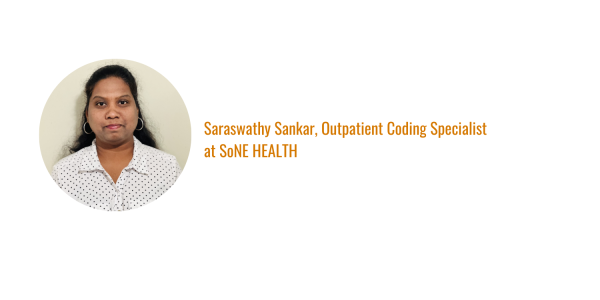By: Saraswathy Sankar
Outpatient Coding Specialist at SoNE HEALTH

In the ever-evolving landscape of healthcare, accurate and detailed coding and documentation have emerged as essential pillars supporting quality care, effective communication, and regulatory compliance. Ensuring that medical information is coded with accurate specificity is not only a requirement; it directly impacts patient outcomes, reimbursement rates, and the overall efficiency of healthcare systems. This precision in coding and documentation serves multiple critical functions, from facilitating accurate diagnoses and tailored treatment plans to supporting data-driven research and quality improvement initiatives.
Hierarchical Condition Categories
HCC (Hierarchical Condition Category) coding is a system used in healthcare for risk adjustment and reimbursement purposes, particularly in Medicare Advantage and other value-based payment models.
What is M.E.A.T?
The M.E.A.T criteria provide a structured framework to guide the documentation process for HCC coding. This approach ensures comprehensive and accurate documentation.
Elements Captured in the M.E.A.T.
Monitor: Document the patient’s diagnosis using specific and accurate medical terminology.
Evaluate: Describe how the diagnosis was assessed or confirmed, which may include laboratory tests, imaging studies, clinical findings, and/or specialist consultations.
Assess: Explain the severity and/or complexity of the diagnosis, its impact on the patient’s health status, and care needs. Provide details on any associated complications or comorbidities.
Treatment: Outline the provider’s plan to manage the diagnosed condition, including treatment strategies, medications prescribed, lifestyle modifications, and/or referrals to specialists.
For Example: A patient with diabetes mellitus:
- Identify the type of diabetes (e.g., type 1, type 2, gestational).
- Document any associated complications (e.g., diabetic retinopathy, diabetic neuropathy).
- Importance of Specific Coding and Documentation
Risk Adjustment & Reimbursement:
- Specific and accurate coding captures the severity and complexity of a patient’s condition, impacting risk adjustment scores and driving appropriate reimbursement.
- Patients with complications may require more intensive management, reflecting the actual level of care required.
Quality of Care:
- Detailed documentation provides a precise understanding of a patient’s condition, allowing for patient-tailored treatment plans.
- Accurate documentation may support continuity of care by providing a comprehensive medical record.
Communication & Coordination:
- Facilitates communication among healthcare providers for consistent and coordinated care.
- Reduces the risk of medical errors by ensuring accurate and specific information.
Data Collection & Analysis:
- Enables accurate data collection valuable for healthcare quality improvement and population health management.
- Identifies trends or patterns in patient care and outcomes.
In summary, accurate and complete Coding & Documentation are essential for:
- Ensuring quality healthcare delivery.
- Effective communication among providers.
- Accurate billing and reimbursement.
Understanding the importance of documentation and coding, SoNE is committed to continual improvement and has offered provider education about risk adjustment via multiple channels. SoNE has realized improved MSSP risk ratio results year over year from 2019-2022. Improvement efforts continue with additional education efforts underway to provide meaningful information about CMS’ transition from Risk Adjustment Model V24 to V28.
*The purpose of this SoNE HEALTH communication is to provide a reminder regarding the importance of accurate documentation in medical records, and should not be construed as medical or legal advice. The information provided here is for general informational purposes only and is not intended as clinical advice. It should not be considered a substitute for professional medical advice, diagnosis, or treatment.
Content courtesy by: AAPC.COM, National Institutes of Health (NIH.gov)
